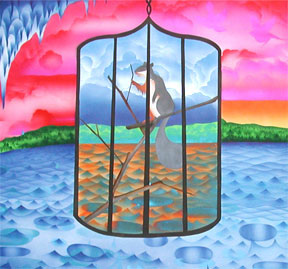But that's not the problem.
The problem is the bees.
Not the dying bees. The live bees. The ones who hate art.
Here's the deal. I do all my work sitting in my comfortable chair overlooking my tiny roof deck container garden, which holds a bird bath and overlooks fantastic magnolia and cherry trees.
I draw in front of the open screen door, and I look up to watch the blue jays and the squirrels drink from my bird bath, and I take breaks to water my lilacs and irises and to draw bugs and sparrows and whatever else comes to the rooftop. It's a blissful routine.
Today, though, I went out to water the plants and was immediately attacked by two giant bees. They're huge. They buzzed my head- one of them hit my hair. I went back inside. I tried again later. Same result. Again. Nearly fell off the roof. I should explain that what I call my roof deck is really just the roof of my neighbor's apartment. It's a three story drop.
I retreated into the studio and closed the screen door behind me, which led me to notice that there are yellow jackets building a nest right above the corner of the screen, where it doesn't really close. Where there's a two inch gap.
(The image is not upside down, the wasps are. They're hanging from the inside of my door frame like Spiderman.)
This yellow jacket action appears to have irritated these other giant bees, who are constantly bombarding the door area with patrols. I closed the sliding glass doors and watched them all for a while, imagining bee vs. wasp feuds or, more likely bee vs. human feuds. I imagined being told, post-fall, that it was nothing personal, that I just got caught up in this whole bee-vs.-human episode that was being fought on other fronts right now. Wrong place at the wrong time, said the bee that was explaining the cause of my untimely death. It got hotter and hotter in my chair as the closed door caused my studio to heat up and the wasps calmly went about building their nest.
I decided my plants could depend on the rain if the bees were going to be that way and lugged all my stuff downstairs to the new apartment, which has back yard. I set myself up with a sun hat on top of my geeky magnifying visor. I looked up at the birds and the manic, giant bees patrolling my roof and got to work on the idyllic nature drawing I'm making these days. In between bouts I sucked up to the neighborhood cat. She eats butterflies. So I can hope for the best.
